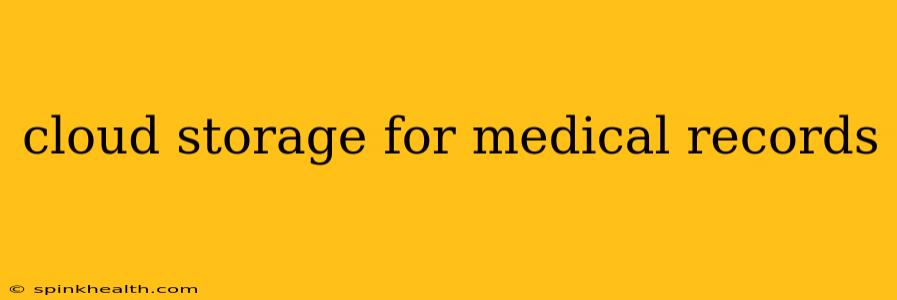The hum of servers, the whirring of hard drives – these are the sounds of traditional data storage, a system increasingly strained by the ever-growing volume of medical records. Enter cloud storage, a seemingly simple solution with profound implications for healthcare providers and patients alike. But is it truly the right fit for the sensitive nature of medical data? This journey delves into the world of cloud storage for medical records, exploring its benefits, challenges, and the crucial considerations for a safe and compliant transition.
What are the benefits of cloud storage for medical records?
Imagine a world where accessing patient files is as easy as logging into a secure portal, regardless of location or time. This is the promise of cloud storage. No more frantic searches through overflowing filing cabinets or the anxieties of misplaced records. Instead, authorized personnel can access necessary information instantly, improving patient care and workflow efficiency. This streamlined access translates directly into quicker diagnosis times, reduced administrative overhead, and better overall patient outcomes. The benefits extend beyond simple accessibility; cloud storage often offers enhanced security features, automated backups, and cost-effectiveness compared to maintaining on-site servers and infrastructure. The flexibility to scale storage as needed, accommodating the continuous growth of patient data, is another significant advantage.
What are the security and compliance concerns regarding cloud storage for medical records?
This utopian vision of effortless access is tempered by serious concerns. Medical records contain extremely sensitive personal information protected by stringent regulations like HIPAA in the US and GDPR in Europe. Data breaches can have devastating consequences, leading to hefty fines, reputational damage, and the erosion of patient trust. Choosing a cloud provider necessitates a thorough evaluation of their security protocols. Features like robust encryption, multi-factor authentication, and rigorous access controls are paramount. Furthermore, ensuring compliance with all relevant data privacy regulations is non-negotiable. This involves understanding the provider’s data residency policies, disaster recovery plans, and audit trails. A provider’s commitment to ongoing security updates and compliance certifications is critical.
What are the different types of cloud storage solutions for medical records?
The cloud storage landscape is diverse, offering various solutions tailored to different needs and budgets. Public cloud storage utilizes shared resources, providing cost-effectiveness but requiring careful consideration of security and compliance. Private cloud storage, on the other hand, provides a dedicated, more secure environment but often involves higher costs. Hybrid cloud storage, a blend of both, offers the best of both worlds, allowing organizations to balance security and cost-effectiveness. The choice depends heavily on the size of the organization, the volume of data, and the level of security required. Careful assessment of these factors is crucial before making a decision.
How do I choose a reliable cloud storage provider for medical records?
Selecting the right cloud storage provider is akin to choosing a trusted guardian for your most sensitive data. Look beyond marketing promises and delve deep into a provider’s security certifications, compliance history, and customer support capabilities. Request detailed information about their data encryption methods, access controls, and disaster recovery plans. Check for independent security audits and testimonials from other healthcare organizations. A provider’s commitment to transparency and their willingness to answer your questions in detail are crucial indicators of reliability. Remember, a robust provider will not only meet but exceed regulatory requirements.
Is cloud storage for medical records HIPAA compliant?
HIPAA compliance is not a feature but a requirement. While cloud storage can be HIPAA compliant, it's essential to verify that the chosen provider adheres to all HIPAA rules and regulations. This includes ensuring Business Associate Agreements (BAAs) are in place, data is encrypted both in transit and at rest, and the provider maintains strict access controls. A provider’s commitment to HIPAA compliance should be clearly documented and easily accessible. Don't hesitate to ask for proof.
What are the costs involved in using cloud storage for medical records?
The cost of cloud storage for medical records varies considerably depending on factors such as storage capacity, features, and the provider's pricing model. Some providers offer pay-as-you-go options, while others use subscription-based models. Factor in the costs of implementation, training, and ongoing maintenance. It's essential to get detailed pricing information upfront and carefully evaluate the long-term costs against the benefits of improved efficiency and reduced administrative overhead. A thorough cost-benefit analysis will help determine if cloud storage is a financially viable option.
The transition to cloud storage for medical records presents both significant opportunities and potential risks. By carefully evaluating security, compliance, and cost considerations, healthcare organizations can harness the power of cloud technology to enhance patient care while upholding the highest standards of data protection. The journey may require careful planning and due diligence, but the rewards – enhanced efficiency, improved accessibility, and enhanced patient care – are well worth the effort.

